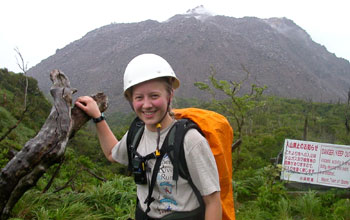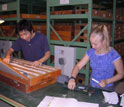News Release 04-083
150 U.S. Graduate Students Embark on Research Experiences in East Asia and Australia

Leslie Almberg, a graduate student from the University of Alaska Fairbanks, begins her first ...
June 18, 2004
This material is available primarily for archival purposes. Telephone numbers or other contact information may be out of date; please see current contact information at media contacts.
American students are happy to find jobs during the summer to help pay for their schooling. Others are more fortunate to be part of intern programs that prepare them for their eventual professional lives. For some others, however, the summer prospects are even more rewarding. How about an opportunity to construct carbon nanotubes in a Sydney, Australia laboratory? What about the chance to study with a molecular virologist in Taipei to search for a potential HIV cure? Or maybe do research based on a fossil fuel carbon emission model created in Seoul to better understand the effects of greenhouse gases?
The National Science Foundation's (NSF) 2004 East Asia and Pacific Summer Institutes Program (EAPSI) for U.S. Graduate Students will offer just such opportunities for 150 advanced science and engineering students this summer in Australia, China, Japan, Korea, and Taiwan. NSF will support these students as they conduct research with foreign counterparts in fields such as cancer research, humanoid robotics, computational neuroscience and nanofabrication.
For example, Matthew Averill, a graduate student at the University of Texas at El Paso, will work on earthquake prediction with researchers at the University of Tokyo. Sarah Rothenberg from the University of California, Los Angeles, will work on modeling urban water demand at China’s Institute of Geographical Sciences and Natural Resources.
"This is the largest contingent of U.S. graduate student participants in the program's 14-year history," according to Larry Weber, who manages the EAPSI program. "These research experiences abroad offer exciting discovery opportunities for talented American science and engineering graduate students, and the program will enable them to have the skills necessary to operate in a competitive international research arena and global marketplace in the future."
The institutes provide U.S. graduate students in science and engineering with first-hand research experiences in Australia, China, Japan, Korea or Taiwan, as well as an introduction to the culture and language of the region. The institutes also offer students first-hand knowledge of the research infrastructure and science policies of their international partners.
The summer institutes last approximately eight weeks from June to August. Each EAPSI awardee receives from NSF an international round-trip air ticket and a stipend of $3,000. Sponsoring organizations in these East Asia and the Pacific communities support students' local living expenses.
NSF administers and manages the EAPSI program through its Office of International Science and Engineering. The National Institutes of Health (NIH) co-sponsor the summer institute in Japan.
Applications are being sought for the 2005 summer institutes. The deadline for submitting those applications is Dec. 10, 2004.
-NSF-
-
Almberg receives some help from Oguri-san, a graduate student in volcanology at the Geological S ...
Credit and Larger Version
For a complete list of 2004 EAPSI awardees and research areas, see: http://www.nsf.gov/pubsys/ods/getpub.cfm?eapsi04
For general program information, see: http://www.nsf.gov/pubsys/ods/getpub.cfm?nsf03608
For more information on application requirements for 2005, see: www.nsftokyo.org/spmenu.htm
Media Contacts
Bill Noxon, NSF, (703) 292-7750, email: wnoxon@nsf.gov
Program Contacts
Anthony Teolis, NSF, (703) 292-7343, email: ateolis@nsf.gov
The U.S. National Science Foundation propels the nation forward by advancing fundamental research in all fields of science and engineering. NSF supports research and people by providing facilities, instruments and funding to support their ingenuity and sustain the U.S. as a global leader in research and innovation. With a fiscal year 2023 budget of $9.5 billion, NSF funds reach all 50 states through grants to nearly 2,000 colleges, universities and institutions. Each year, NSF receives more than 40,000 competitive proposals and makes about 11,000 new awards. Those awards include support for cooperative research with industry, Arctic and Antarctic research and operations, and U.S. participation in international scientific efforts.
Connect with us online
NSF website: nsf.gov
NSF News: nsf.gov/news
For News Media: nsf.gov/news/newsroom
Statistics: nsf.gov/statistics/
Awards database: nsf.gov/awardsearch/
Follow us on social
Twitter: twitter.com/NSF
Facebook: facebook.com/US.NSF
Instagram: instagram.com/nsfgov



